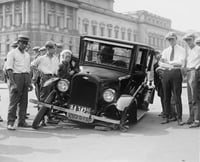
Coaching the uncoachable
Recently, I had the honor of participating in a webcast on coaching, with Lori Richardson, Jason Jordan, and Mike Kunkle. A question that rarely comes up was, “What do you do if a person is uncoachable?”
This is one area of coaching where I tend to be pretty hard-nosed, but I believe the following:
If a person is uncoachable, it is not a question of IF that individual is terminated, only When!
Let me explain myself.
The uncoachable person has made the decision to stop learning and growing. We’ve all encountered people like this. They refuse to take feedback (or at least smile, nod, then ignore it.) They believe they have learned everything they can, they have mastered their jobs. They say, “Just leave me alone and let me do my job.”
Recently, I encountered a couple of sales people who were uncoachable. We were doing a number of deal reviews. Their attitudes clearly showed how much the resented spending the time with their CRO, their manager, and me. They said things like:
- “Trust me, I’ll make my numbers…..” when I asked them, “You are less than 25% YTD and you don’t have anything in your pipelines, how are you going to make your numbers? What help do you need?” (we were in Q3)
- “You don’t understand our markets….” I may not have, but clearly the CRO and their manager did.
- “Cold calling and most prospecting doesn’t work anymore…..” Hmmmm, that’s interesting, then how do you and millions of other sales people find opportunities.
- “You don’t understand this customer or this deal…..” To which I respond, “OK, tell me about it, what are they trying to do, what is their need to buy, what happens if they don’t make a decision by the date you claim?”
- In one discussion, a key issue with a partner arose. One of the participants had just been recruited from the partner. That individual offered to help, “I know how they work, I still have great relationships with senior management, perhaps I can help….” To which the sales person responded, “You don’t understand anything, you are new, you can’t help, stay out of this deal!”
- “Do you realize how much you are distracting from my ‘selling time…?'” I thought, “This is the only review in 30 days and it is only 45 minutes, and you are only 25% YTD…..I’m not sure I’m wasting anyone’s time, except perhaps mine.”
I could go on, there were many more examples of their unwillingness to be coached, to ask for and accept help.
You’ve probably encountered these types of people before. They are uncoachable.
Some of them may actually be doing OK, they might be making their numbers, but they believe they know everything and don’t need to learn any more, to change, or adapt.
Never stop learning
The problem with the uncoachable is they have made the decision to stop learning, to stop growing, to stop changing. Even if they are a top performer today, they will quickly become dinosaurs. No one can afford to adopt that mindset in today’s fast changing world.
Research on sustained top performers shows that the are obsessive in their learning and relentless in execution. The constantly change, grow, and seek to improve. They recognize to be a top performer, they can never stop learning.
So the uncoachable have decided there is no more to learn, grow, and improve. They’ve decided they know everything.
As I’ve mentioned, this is a mindset focused on failure. Perhaps not today, but certainly for tomorrow.
What do we do with these people? We have to terminate them–perhaps not today, but probably soon. They will not be able to meet their performance expectations. They are likely to be–or become–toxic to the organization, dragging down the performance of others in the organization.
As I mentioned at the beginning, with the uncoachable, it’s not a question of If we terminate them, only When.
Now for the one caveat. We have to make sure the person is truly uncoachable. Perhaps our own efforts to coach them are rebuffed, but that doesn’t necessarily mean they aren’t uncoachable, we may just be the wrong coaches. Before we decide a person is uncoachable, we need to give them the opportunity to be coached, not just by us, but by others in the organization. If no one can connect with them, then they are, likely uncoachable.

By Dave Brock
Dave has spent his career developing high performance organizations. He worked in sales, marketing, and executive management capacities with IBM, Tektronix and Keithley Instruments. His consulting clients include companies in the semiconductor, aerospace, electronics, consumer products, computer, telecommunications, retailing, internet, software, professional and financial services industries.
Find out more about Dave Brock on LinkedIn







